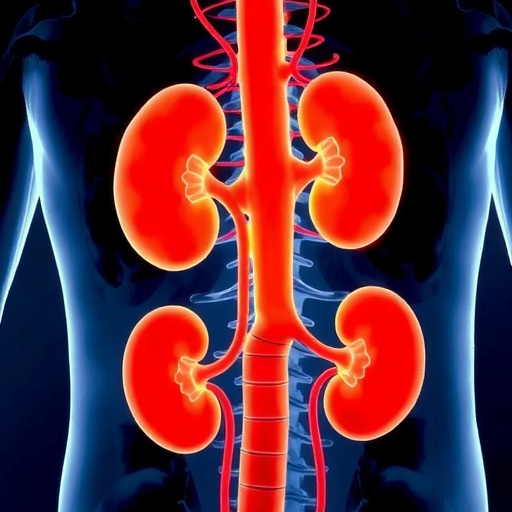
In an era where mental health remains a focal point of public health discussions, innovative solutions continuously emerge to address the complexities surrounding emotional well-being. One particularly promising development is a recent pilot study led by researchers Sakimoto, Uchida, and Igusa into the use of a web video-based positive word stimulation program tailored specifically for older patients with cardiac disease and subthreshold depression. This study, published in the European Geriatric Medicine journal, was conducted within the unique context of an acute care ward. The findings reveal compelling insights into how digital tools can intersect with traditional healthcare to foster emotional resilience among vulnerable populations.
The study’s premise centers on a growing body of research highlighting the importance of positive psychological interventions in improving mental health outcomes. Older adults traditionally face a myriad of challenges, including the overt impacts of chronic illness and the often-overlooked psychological burdens that accompany them. By harnessing the power of digital technology, the researchers aimed to create an engaging platform that employed positive affirmations and stimulating content to uplift mood and promote mental well-being among those grappling with the dual challenges of cardiac disease and depression.
Engaging with the hypothesis, the researchers conducted a randomized controlled trial, enrolling participants who met the criteria of having cardiac illness alongside symptoms of subthreshold depression. This particular demographic is especially vulnerable, and the study aimed to determine if even minimal interventions could produce significant mental health benefits. As the world increasingly pivots towards telehealth and online resources, the importance of such innovative approaches becomes even clearer. The structure of the trial was such that participants were randomly assigned to either the intervention group, who engaged with the video program, or a control group, who did not receive any additional intervention.
The digital intervention consisted of a series of short, upbeat video clips that presented positive words and visually stimulating content aimed at engaging viewers emotionally and cognitively. Each clip was designed to be concise yet impactful, making it easier for participants to absorb the material even within the busy and often stressful environment of a hospital ward. The researchers curated the content carefully, ensuring that the selections focused on words and themes known to evoke positive emotional responses.
Initial results were promising, indicating that those who participated in the positive word stimulation program reported not only improved mood but also an enhanced sense of overall well-being. The outcomes mirrored findings from previous studies suggesting that even brief interventions can efectively change emotional states. Through quantitative assessments and qualitative feedback, it became evident that engaging with positive affirmations could act as a buffer against the emotional turmoil faced by patients dealing with chronic health conditions.
Moreover, the implications of this pilot study extend far beyond the immediate findings. As healthcare systems grapple with the increasing demands placed on mental health resources, digital interventions like this could bridge significant gaps, particularly for older adults who may find it difficult to engage in traditional forms of therapy. The results thus raise critical questions about scalability and accessibility of such programs to broader populations, potentially leading to widespread implementations in various healthcare settings.
Additionally, the program speaks to a larger cultural shift towards the acceptance of technology as a viable means of delivering healthcare solutions. Where once some may have dismissed digital-based interventions as frivolous or ineffective, research now presents compelling evidence that technology has a place in serious health interventions. For older adults, who might be less inclined to seek treatment or participate in therapy, digital solutions may represent a comfortable and engaging alternative to traditional methods.
From a clinical perspective, integrating programs that emphasize positive emotional engagement could serve as a foundational element for holistic treatment approaches in geriatric care. The nexus between emotional well-being and physical health becomes increasingly evident, particularly in populations where chronic conditions prevail. This study provides a stepping stone for future research exploring the intersection of psychological interventions and physical health outcomes, broadening the scope of geriatric medicine.
While these findings represent a significant advancement in understanding patient care for older adults with depression and chronic illness, they are merely the beginning. Future iterations of the program could integrate more interactive elements, allowing for greater personalization and responsiveness to individual patient needs. Incorporating feedback loops where patients can recommend or tailor content based on their experiences may enhance engagement and efficacy.
In addition, the potential for further research is vast. Investigating the longevity of the program’s effects, understanding the neurochemical implications of positive emotional stimuli, and exploring different demographics could yield invaluable insights. Researchers should also consider evaluating the impact of similar programs in various settings, such as outpatient facilities, rehabilitation centers, and even home care environments.
The pilot study’s success provides a robust framework for subsequent studies to build upon. Researchers and healthcare providers alike should focus on breaking down barriers to technology access for older adults, ensuring that all populations can benefit from such innovative mental health interventions. Future research endeavors could explore partnerships with tech companies to create customized platforms that cater specifically to the unique needs of older patients.
Ultimately, this pilot study showcases a promising direction for treating subthreshold depression in older adults, melding traditional medical care with innovative psychological interventions. Emphasizing the union between the mind and body in a holistic care approach, researchers have illuminated a pathway toward improved patient outcomes and enriched quality of life for one of society’s most vulnerable populations. As the field of geriatric medicine continues to evolve, studies like this pave the way for exciting advancements that consider both physical and emotional health in treatment paradigms.
Such pioneering work demonstrates the necessity for ongoing examination of how best to leverage technology for positive health outcomes. This study represents just one facet of a broader movement aimed at enhancing mental health strategies and creating comprehensive care models that acknowledge the crucial interplay between physical and psychological wellness. Further exploration along these lines is not just beneficial—it is essential.
As mental health awareness grows, initiatives centered on positive psychological reinforcement will likely gain traction, providing a beacon of hope for those in need. The ongoing interplay between research, technology, and patient care will undoubtedly forge new pathways for enhancing quality of life among older adults facing health challenges—a testament to the scientific community’s commitment to finding solutions that resonate deeply with human experience.
Subject of Research: Mental health interventions for older adults with cardiac disease and depression.
Article Title: Feasibility of a web video-based positive word stimulation program for older patients with cardiac disease and subthreshold depression admitted to an acute care ward: a pilot randomized controlled trial.
Article References:
Sakimoto, M., Uchida, H., Igusa, T. et al. Feasibility of a web video-based positive word stimulation program for older patients with cardiac disease and subthreshold depression admitted to an acute care ward: a pilot randomized controlled trial.
Eur Geriatr Med (2025). https://doi.org/10.1007/s41999-025-01258-0
Image Credits: AI Generated
DOI: 10.1007/s41999-025-01258-0
Keywords: mental health, aging, cardiac disease, depression, digital interventions, positive reinforcement, geriatric care, psychological well-being.
Tags: digital health solutions for mental wellnessdigital tools for mental health improvementemotional well-being in cardiac diseaseenhancing emotional resilience in vulnerable populationsinnovative approaches to mental health caremental health strategies for aging populationspositive psychology in geriatric medicinepositive word stimulation program for older adultspsychological interventions for chronic illnessrandomized controlled trial in healthcare researchsubthreshold depression in elderly patientsweb video interventions for cardiac patients




